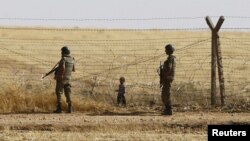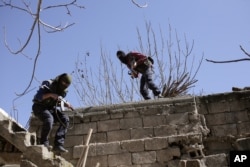Turkish President Recep Tayyip Erdogan has warned that the military could intervene in Syria to stop ongoing rocket attacks by so-called Islamic State group. But critics claim Erdogan’s real priority for intervening would be to target Syrian Kurdish forces it accuses of being linked to the PKK. And experts warn any intervention would need cooperation from other countries or run the risk of military confrontation.
In the past few weeks, the Turkish military has been amassing armor and soldiers along its Syrian border, where Islamic State has been firing missiles into the Turkish town of Kilis — a town that straddles the southern border with a volatile zone in Syria currently controlled by Islamic State.
In response, President Erdogan has said that his armed forces are readying to “clear” the frontier on the Syrian side of the border, following back and forth fire with Islamic State terrorists.
But Kadri Gursel, political columnist for the Turkey’s Cumhuriyet and Al Monitor website, said any intervention would not be aimed at Islamic State, also known as ISIS.
"The priority of Erdogan’s Turkey has never been ISIS," he said. "The Syrian Kurds are the priority target, and it’s still Syrian Kurds. So to prevent PYD — which is an ideological offshoot of PKK, and there are strong organic ties between the two organizations — they want to prevent Syrian Kurds and the [Syrian] regime forces from gaining ground. "
The PKK is fighting the Turkish state for greater minority rights. Its fighters also have been supporting the Syrian Kurdish group the PYD, which has been making substantial gains against Islamic State in recent months backed by U.S. forces. Only a small strip of Syrian border territory remains out of their control.
Turkish political consultant Atilla Yesilada of Global Source Partners said those gains mean Erdogan’s warnings of an intervention should be taken seriously.
"I think Erdogan and the Turkish chiefs of military staff are weighing the risks of a Kurdish state in Syria versus a Russian attack on Turkish forces," he said. "To me it’s a suicide mission because Russians would bomb Turkish military if we entered Syria."
Following November’s downing by Turkish jets of a Russian bomber operating from a Syrian base, Moscow has deployed a sophisticated anti-aircraft missile system.
Those missiles have, until now, prevented Turkish fighters from entering Syria’s airspace. But according to media reports earlier this month, Turkish special forces carried out Syrian cross-border operations against Islamic State with Moscow’s permission.
Retired Turkish Brigadier Haldun Solmazturk warns that any type of intervention in Syria would have to be substantial and well secured.
"Air, army, boots on ground, special forces, etc., it would be quite complicated and would require full strength and full capability," he said. "In any military operation, you have to control your rear area. It’s vital. And, the so-called rear area for an intervention in Syria, which is in Turkey, is in turmoil now. The conflicts in the region with the PKK are far from being under control."
On Friday, at least eight Turkish soldiers were killed in fighting with PKK rebels, including two others who were killed when a helicopter crashed during a military operation. Fighting between the army and rebels continues to escalate, with hundreds killed on both sides in the last few months.
Observers warn any military intervention into Syria that would also target Syrian Kurdish forces would likely see a further escalation in PKK operations, resulting in a two-front war for the Turkish army.





